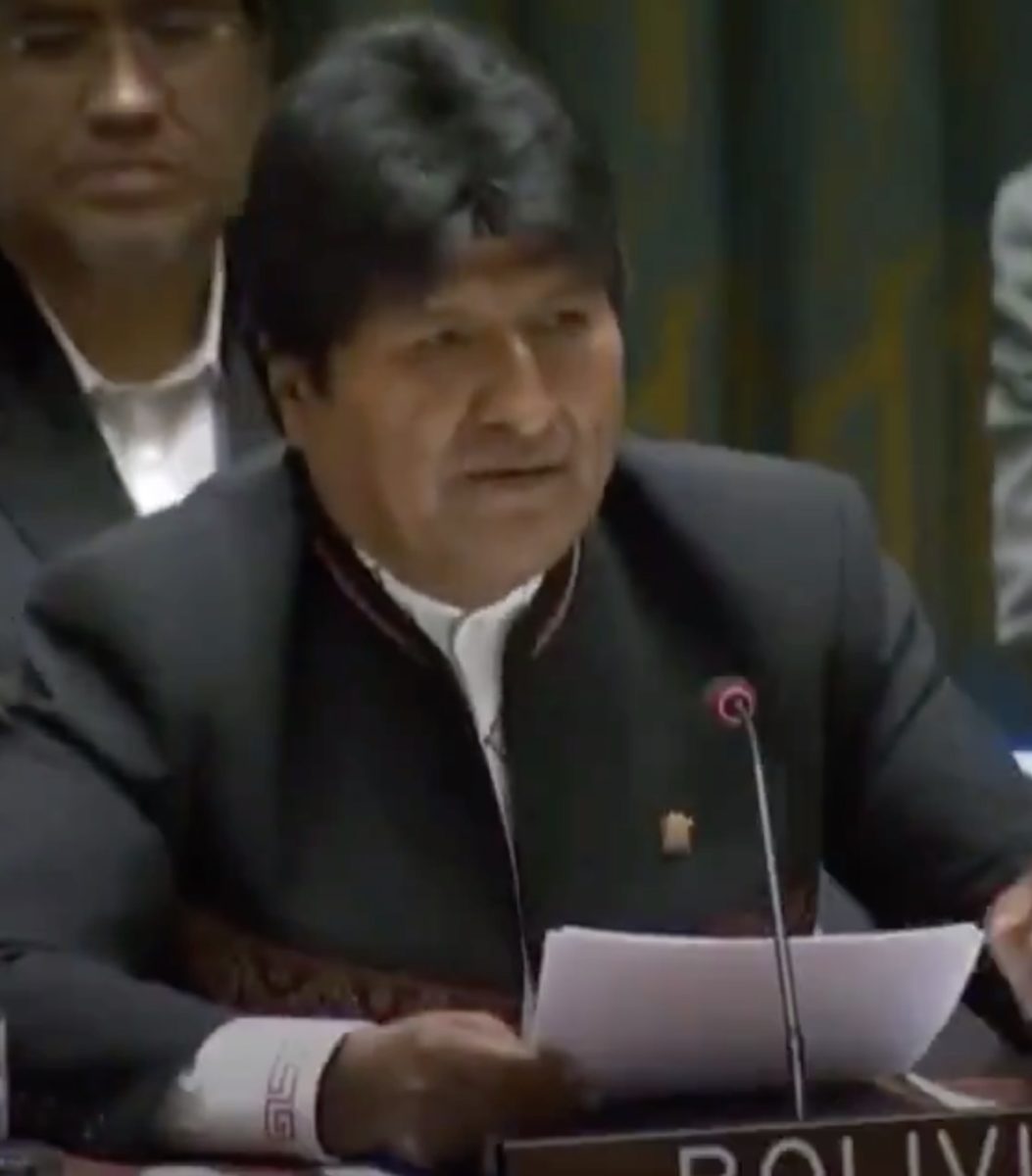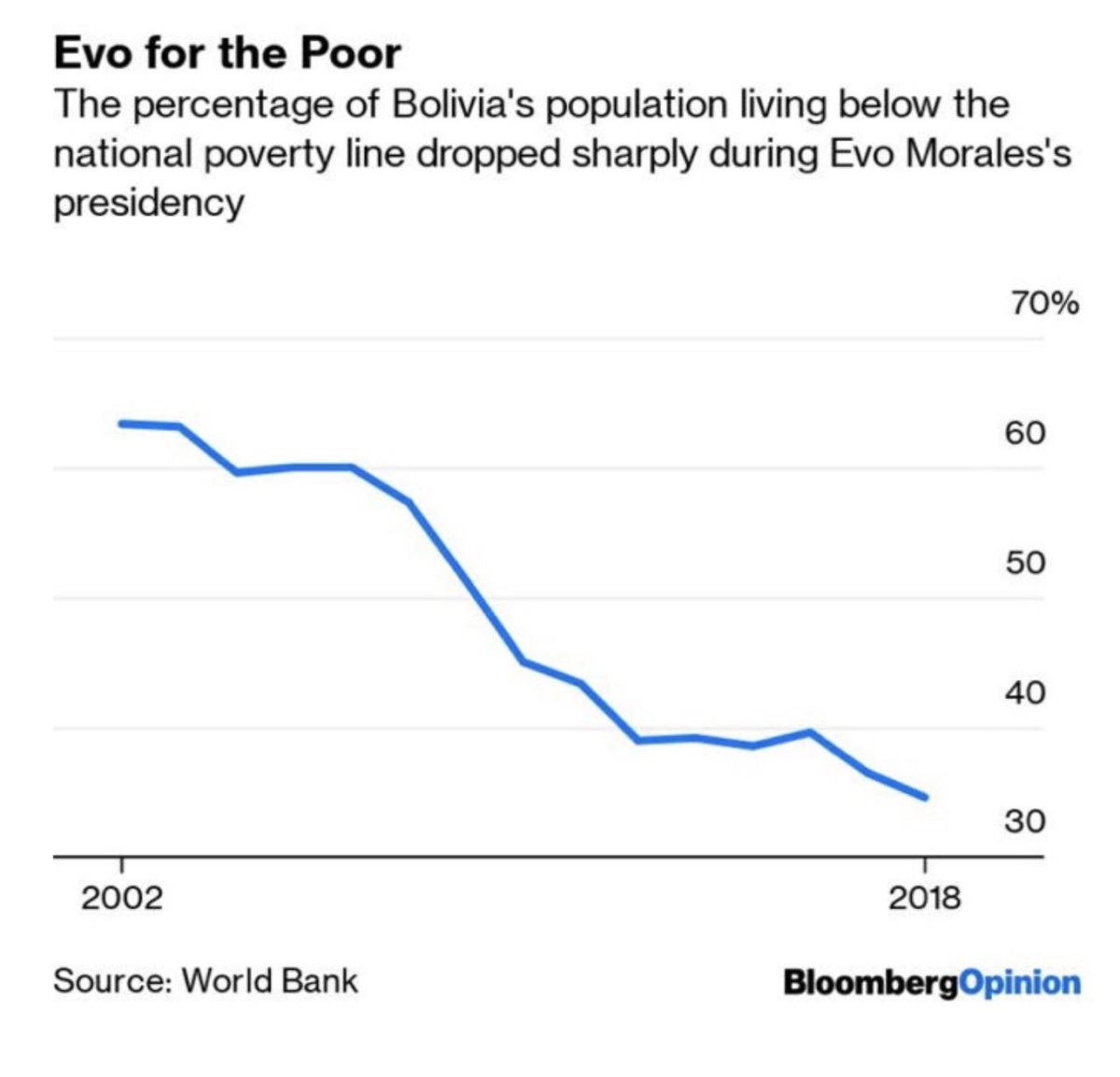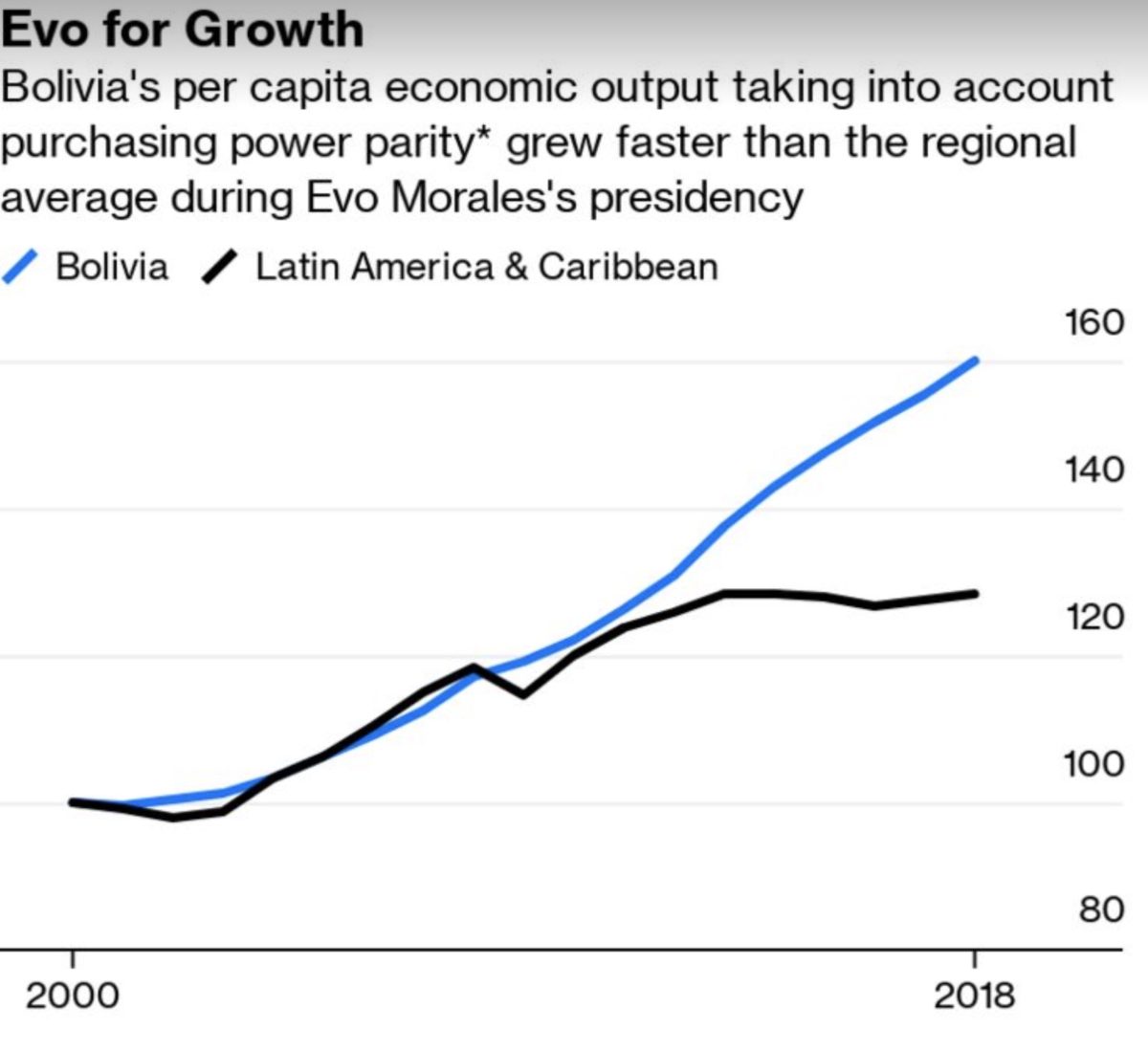
Two days before Bolivian president Evo Morales was pushed out by the country’s military, Mark Weisbot of the Center for Economic and Policy Research penned a warning about what was happening, and what might unfold, in a Nation article titled, The Trump Administration Is Undercutting Democracy in Bolivia.
He noted:
Multilateral organizations like the Organization of American States (OAS) have a certain perceived impartiality because they are, in theory, controlled by a diverse group of nations. But sometimes a great power can wield a disproportionate influence. It could theoretically be a coincidence that both the Trump administration and the OAS have tried—without offering any evidence—to discredit Bolivia’s national election in the past couple of weeks. But it’s more likely that this dangerous, ugly, and destabilizing operation is being pushed by Washington.
This “destabilizing operation” came to a head yesterday when Morales resigned under pressure from the military amidst a wave of protests and violence. The situation is Bolivia is complicated, but one thing you can be sure of is anything you hear or read in U.S. mass media will be a heaping pile of lies and propaganda. Fortunately, I came across a really helpful thread courtesy of Kevin Cashman.
THREAD: If you haven't been following the situation in Bolivia here's a rundown. Briefly, the OAS, an emboldened opposition (which clearly is not the most popular party in the country), the media, and the Trump admin ousted a successful leftist leader. For the longer story:
— Kevin Cashman (@kevinmcashman) November 11, 2019
Morales was barred by the constitution from running for another term, but he attempted to override this with a referendum which he lost 51% to 49%. The Bolivian Supreme Court later ruled that term limits were unconstitutional, so he decided to run again. He then won this new election in the first round by the 10% spread required, but the Organization of American States (OAS) immediately called into question the validity of the result. This sparked weeks of protests and culminated in yesterday’s military coup. According to Mark Weisbot, the OAS has provided zero evidence of election fraud, and also notes that approximately 60% of the OAS budget comes from the U.S. government.
Personally, I think Morales should’ve accepted the referendum result and stepped aside, but the military deciding the situation (with likely assistance from the U.S. government/CIA) is not something anyone should cheer on.
Interesting to note that the military isn’t rising up to depose leaders in countries with big protests as long as the CIA likes the leaders in power.
See Chile and France. This couldn’t be more obvious. https://t.co/nIfUBPBQAi— Michael Krieger (@LibertyBlitz) November 11, 2019
There are massive, widespread protests happening all over the world. Wanting the military/national security state to intervene is a bad idea under almost all circumstances. It’s a bad idea in the U.S. , and it’s a bad idea abroad.
— Michael Krieger (@LibertyBlitz) November 11, 2019
It seems likely what went down in Bolivia is part of the global proxy war the Trump administration is waging against countries like China and Russia in order to push back against the ongoing transition to a multi-polar geopolitical world. Natural resources always play a key role in such struggles, and Bolivia is no exception thanks to massive lithium reserves, some of which Morales agreed to develop with China earlier this year.
As Reuters reported back in February:
Bolivia has chosen a Chinese consortium to be its strategic partner on new $2.3 billion lithium projects, the government said on Wednesday, giving China a potential foothold in the country’s huge untapped reserves of the prized electric battery metal.
China’s Xinjiang TBEA Group Co Ltd will hold a 49 percent stake in a planned joint venture with Bolivia’s state lithium company YLB, the Bolivian firm said…
Bolivia has some of the world’s largest reserves of lithium – a key component in batteries that power electric cars – but has yet to produce the metal at a commercial scale.
It’s going to be very interesting to watch how things unfold in Bolivia from here. Although Morales lost the referendum to run for another term, my guess is a lot of those who voted against him at the time aren’t pleased with the military coming in to handle the situation. Although it’s not often highlighted in U.S. mass media, Morales achieved a great deal of success economically and socially during his presidency.
For instance, poverty plummeted dramatically:
Then there’s this.
Whether you love him, hate him, or feel indifference, there’s no denying Morales did a lot for many Bolivians who probably won’t take too kindly to what’s being done to him and his supporters by the opposition and military. Let’s not forget he was also the first indigenous president of Bolivia, a country with the largest proportion of indigenous people in Latin America. This story is far from over.
Bigger picture, the escalation in Bolivia is further evidence of the ongoing trend of political chaos around the world, which is likely get worse and spread to ever more corners of the globe. I continue to believe this unrest is largely symptomatic of the death throes of a dying geopolitical and financial paradigm that’s dominated the world for decades. Keep your seatbelts fastened; things can change, and change very quickly irrespective of where you reside. Such are the times we live in.
Liberty Blitzkrieg is now 100% ad free. To make this a successful, sustainable thing consider the following options.
You can become a Patron.
You can visit the Support Page to donate via PayPal, Bitcoin or send cash/check in the mail.
Donate bitcoins: 35DBUbbAQHTqbDaAc5mAaN6BqwA2AxuE7G
Follow me on Twitter.





The Monroe Doctrine is still in effect. Other realities are also in effect such as the grotesque labor situation for miners in Bolivia, many of whom are children as young as six years old. While the Morales government did a pretty good job and in just sixteen years, in some situations it has turned a blind eye to the slave conditions that produced much of that wealth. Bolivia is very blessed with minerals but under the same old colonialism the people actually harvesting that wealth are used up and cast aside, or die, as little more than broken easily replaced machinery. It is a sin to use people or yourself as a thing. As for Washington, its government and agencies are always ready to serve at the behest of its real controllers. If the Chinese had been able to gain a foothold I doubt very much that conditions would have changed all that much from what exists now. Multi polar does not mean any more just and may actually be the planned mechanism to abolish human rights as moral relativism and social credit scoring replaces constitutional law.
Too bad we conveniently forget the second part of the Monroe Doctrine, that we will interfere ONLY in the Americas. We’re supposed to leave the rest of the world alone, and since 1945 and the advent of the American Empire we’ve done anything but.
This summary explains a lot.
https://understandingourslavery.com/wp-content/uploads/2018/08/Understanding_Our_Slavery_Book_in_PDF.pdf
Evo Morales was an independent man who did not dance to the tune of Washington D.C., therefore he had to go. Never mind he was the best thing to have happened to the Bolivian people since time immemorial. You don,t dance to the tune of your masters from the north, you refuse to ¨privatize everything, you kick out Coca Cola, you are a done deal. It´s that simple, I should hve saiod tragic.
A few facts about the situation in Bolivia.
When Evo Morales won in 2005, he promptly set about rewriting the constitution. It took him 4 years to push his constitution through. Since those 4 years were under the old Constitution, he considered that they did not count toward the two 5-year term limit. So he has now completed 14 years in office.
That wasn’t enough for him to complete his ‘process of change’ so he announced his intention to run again in spite of the fact that it was illegal by the Constitution he himself was responsible for. As mentioned in this article, a referendum was held in 2016 and he lost. So what? He soon announced his intention to disregard the result of the referendum. On his demand, the two-term limit was reviewed and declared to be a violation of his ‘human rights’.
The resulting conflict has now been looming over the country for 3.5 years. Discontent was widespread, but it was unclear to anyone in Bolivia if he had the support necessary to remain in power or not. It was widely considered that he would win no matter what, and then it would be a contest to see if he could govern the country.
Bolivia does not have a tradition of democratic transition of power. As of Morales’ win in 2005, it was said that Bolivia had had more presidents than years in its history since independence.
So it is hardly necessary to conjure up a US-sponsored coup to make sense of what has happened in Bolivia.
While it is certainly possible that the US has had some influence over how things have shaken out, evidence is so far lacking. It’s key to see what evidence the OAS has for electoral fraud.
A few other pertinent observations.
Bolivia is a country with 30+ ethnic groups. That Evo Morales comes from one of them can hardly be taken to assure that he will be a champion for all of them, Disneyland theories of armchair Leftist geopoliticians notwithstanding. Regional rivalries are much stronger than in the US. Mountain people and lowland people do not share a common history, culture, or respect for each other. Yet mountain folks from La Paz police every corner of the country. What would all the Justice Warriors expounding on Bolivia have to say about such a rotten situation in other circumstances?
It’s also worth remembering that Morales was and is the head of the Coca growers’ syndicate, with all that implies in a country where perhaps more than a third of the economy relies on cocaine. Maybe Leftist Justice Warriors don’t have a problem with Bolivia being a narco-state? Maybe they don’t mind the concentration of power resulting from combining the presidency of the country and of coca growing?
As I read all the formulaic know-nothing commentaries from the Left, I can only shake my head ruefully that I used to take people like Weisbrot much more seriously. The Saker, terrible. Even Paul Craig Roberts (and I’m a fan) is well off the mark.
The best commentary I’ve seen:
https://www.henrymakow.com/2019/11/good-riddance-evo-morales.html
The proper context is the Hegelian dialectic left-right charade:
https://www.henrymakow.com/2019/11/edo-morales-and-the-fake-Left-Right-charade.html
Here are a couple of articles highlighting coup links to the U.S., which would be the norm, not the exception in Latin America.
Bolivia Coup Led by Christian Fascist Paramilitary Leader and Millionaire – with Foreign Support:
https://thegrayzone.com/2019/11/11/bolivia-coup-fascist-foreign-support-fernando-camacho/
Top Bolivian Coup Plotters Trained by U.S. Military’s School of the Americas, Served as Attachés in FBI Police Programs:
https://thegrayzone.com/2019/11/13/bolivian-coup-plotters-school-of-the-americas-fbi-police-programs/
To be clear, I agree that USA coups have been very much the norm in Latin American history and elsewhere (though AmeroAngloZio alliance is much more accurate than merely ‘USA’, and not necessarily in that order).
This one-minute clip says a lot about Morales’ character, though. It’s not hard to understand how Bolivia grew tired of him.
As for the economy, a couple of things are worth pointing out about the charts above.
The second chart starts from a point where Bolivia’s economy was utterly depressed, after the financial crisis in Argentina, 1998-2002. A day laborer that made <$4 in 2004 now makes ~$15-$20. Furthermore, as is so commonly pointed out, Bolivia is one of the poorest countries in Latin America. So the outperformance in this chart, while commendable, is not as impressive as it looks–high % growth rate is relatively easy from a very small base.
R.e. the first chart, aside from also starting at a point in time very advantageous to MAS/Morales, the devil is in the details… For instance, increasing financialization of an economy could lead to improvement in the WB's poverty stat without reflecting quality-of-life improvement. Or simply if inflation + population growth = economic growth. As a premier Globalist institution the World Bank deserves the 'DIStrust, but verify' approach.
Anecdotally, certainly Bolivia has grown a lot economically, though credit has also become much easier to obtain, which clouds the picture. Inflation and wage growth have been high. It's unclear, however, how much conditions have improved for those who work to eat. Not so much, if at all, in the areas I've seen. But likely many rural people in the mountain regions, who have had a hard lot for many generations, have seen real benefits. So that goes on the positive side of the ledger. Likewise, he has provided transfer payments for the elderly and school children. Small amounts, but they make a real difference for people who need it. Another positive, on balance, for me. But this kind of socialism easily devolves into vote buying and dependency, so is only good if it goes hand-in-hand with a solid plan to strengthen the economy, create jobs, eliminate abuses/corruption, and reduce then eliminate such payments over time. IOW, transfer payments to those in extreme poverty may be a good thing to do, but it qualifies as gaming the World Bank poverty stat too; is it contributing to sustainable improvement?
Finally, for those who take such stats as 'the second poorest country in Latin America' too seriously, look up some photos of the Oruro carnaval.
https://duckduckgo.com/?q=oruro+carnaval&t=ffab&iax=images&ia=images
The huge amount of time and $ they invest in this festival indicates plenty of disposable resources. Likewise, their socializing and partying makes the USA look like a country of hermits. Abstract economic stats don't fully reflect the multidimensionality of different culturallifestyle priorities.